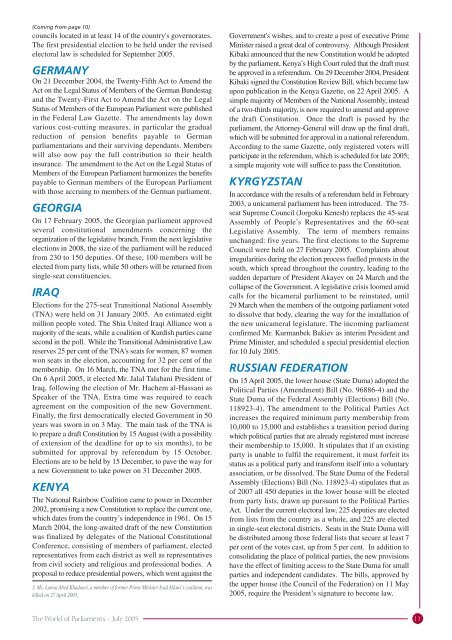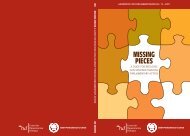PDF 631 Kb - Inter-Parliamentary Union
PDF 631 Kb - Inter-Parliamentary Union
PDF 631 Kb - Inter-Parliamentary Union
Create successful ePaper yourself
Turn your PDF publications into a flip-book with our unique Google optimized e-Paper software.
(Coming from page 10)<br />
councils located in at least 14 of the country's governorates.<br />
The first presidential election to be held under the revised<br />
electoral law is scheduled for September 2005.<br />
GERMANY<br />
On 21 December 2004, the Twenty-Fifth Act to Amend the<br />
Act on the Legal Status of Members of the German Bundestag<br />
and the Twenty-First Act to Amend the Act on the Legal<br />
Status of Members of the European Parliament were published<br />
in the Federal Law Gazette. The amendments lay down<br />
various cost-cutting measures, in particular the gradual<br />
reduction of pension benefits payable to German<br />
parliamentarians and their surviving dependants. Members<br />
will also now pay the full contribution to their health<br />
insurance. The amendment to the Act on the Legal Status of<br />
Members of the European Parliament harmonizes the benefits<br />
payable to German members of the European Parliament<br />
with those accruing to members of the German parliament.<br />
GEORGIA<br />
On 17 February 2005, the Georgian parliament approved<br />
several constitutional amendments concerning the<br />
organization of the legislative branch. From the next legislative<br />
elections in 2008, the size of the parliament will be reduced<br />
from 230 to 150 deputies. Of these, 100 members will be<br />
elected from party lists, while 50 others will be returned from<br />
single-seat constituencies.<br />
IRAQ<br />
Elections for the 275-seat Transitional National Assembly<br />
(TNA) were held on 31 January 2005. An estimated eight<br />
million people voted. The Shia United Iraqi Alliance won a<br />
majority of the seats, while a coalition of Kurdish parties came<br />
second in the poll. While the Transitional Administrative Law<br />
reserves 25 per cent of the TNA's seats for women, 87 women<br />
won seats in the election, accounting for 32 per cent of the<br />
membership. On 16 March, the TNA met for the first time.<br />
On 6 April 2005, it elected Mr. Jalal Talabani President of<br />
Iraq, following the election of Mr. Hachem al-Hassani as<br />
Speaker of the TNA. Extra time was required to reach<br />
agreement on the composition of the new Government.<br />
Finally, the first democratically elected Government in 50<br />
years was sworn in on 3 May. The main task of the TNA is<br />
to prepare a draft Constitution by 15 August (with a possibility<br />
of extension of the deadline for up to six months), to be<br />
submitted for approval by referendum by 15 October.<br />
Elections are to be held by 15 December, to pave the way for<br />
a new Government to take power on 31 December 2005.<br />
KENYA<br />
The National Rainbow Coalition came to power in December<br />
2002, promising a new Constitution to replace the current one,<br />
which dates from the country’s independence in 1961. On 15<br />
March 2004, the long-awaited draft of the new Constitution<br />
was finalized by delegates of the National Constitutional<br />
Conference, consisting of members of parliament, elected<br />
representatives from each district as well as representatives<br />
from civil society and religious and professional bodies. A<br />
proposal to reduce presidential powers, which went against the<br />
3. Ms. Lamia Abed Khadouri, a member of former Prime Minister Iyad Allawi's coalition, was<br />
killed on 27 April 2005.<br />
Government's wishes, and to create a post of executive Prime<br />
Minister raised a great deal of controversy. Although President<br />
Kibaki announced that the new Constitution would be adopted<br />
by the parliament, Kenya’s High Court ruled that the draft must<br />
be approved in a referendum. On 29 December 2004, President<br />
Kibaki signed the Constitution Review Bill, which became law<br />
upon publication in the Kenya Gazette, on 22 April 2005. A<br />
simple majority of Members of the National Assembly, instead<br />
of a two-thirds majority, is now required to amend and approve<br />
the draft Constitution. Once the draft is passed by the<br />
parliament, the Attorney-General will draw up the final draft,<br />
which will be submitted for approval in a national referendum.<br />
According to the same Gazette, only registered voters will<br />
participate in the referendum, which is scheduled for late 2005;<br />
a simple majority vote will suffice to pass the Constitution.<br />
KYRGYZSTAN<br />
In accordance with the results of a referendum held in February<br />
2003, a unicameral parliament has been introduced. The 75-<br />
seat Supreme Council (Jorgoku Kenesh) replaces the 45-seat<br />
Assembly of People’s Representatives and the 60-seat<br />
Legislative Assembly. The term of members remains<br />
unchanged: five years. The first elections to the Supreme<br />
Council were held on 27 February 2005. Complaints about<br />
irregularities during the election process fuelled protests in the<br />
south, which spread throughout the country, leading to the<br />
sudden departure of President Akayev on 24 March and the<br />
collapse of the Government. A legislative crisis loomed amid<br />
calls for the bicameral parliament to be reinstated, until<br />
29 March when the members of the outgoing parliament voted<br />
to dissolve that body, clearing the way for the installation of<br />
the new unicameral legislature. The incoming parliament<br />
confirmed Mr. Kurmanbek Bakiev as interim President and<br />
Prime Minister, and scheduled a special presidential election<br />
for 10 July 2005.<br />
RUSSIAN FEDERATION<br />
On 15 April 2005, the lower house (State Duma) adopted the<br />
Political Parties (Amendment) Bill (No. 96886-4) and the<br />
State Duma of the Federal Assembly (Elections) Bill (No.<br />
118923-4). The amendment to the Political Parties Act<br />
increases the required minimum party membership from<br />
10,000 to 15,000 and establishes a transition period during<br />
which political parties that are already registered must increase<br />
their membership to 15,000. It stipulates that if an existing<br />
party is unable to fulfil the requirement, it must forfeit its<br />
status as a political party and transform itself into a voluntary<br />
association, or be dissolved. The State Duma of the Federal<br />
Assembly (Elections) Bill (No. 118923-4) stipulates that as<br />
of 2007 all 450 deputies in the lower house will be elected<br />
from party lists, drawn up pursuant to the Political Parties<br />
Act. Under the current electoral law, 225 deputies are elected<br />
from lists from the country as a whole, and 225 are elected<br />
in single-seat electoral districts. Seats in the State Duma will<br />
be distributed among those federal lists that secure at least 7<br />
per cent of the votes cast, up from 5 per cent. In addition to<br />
consolidating the place of political parties, the new provisions<br />
have the effect of limiting access to the State Duma for small<br />
parties and independent candidates. The bills, approved by<br />
the upper house (the Council of the Federation) on 11 May<br />
2005, require the President’s signature to become law.<br />
The World of Parliaments - July 2005<br />
11
















